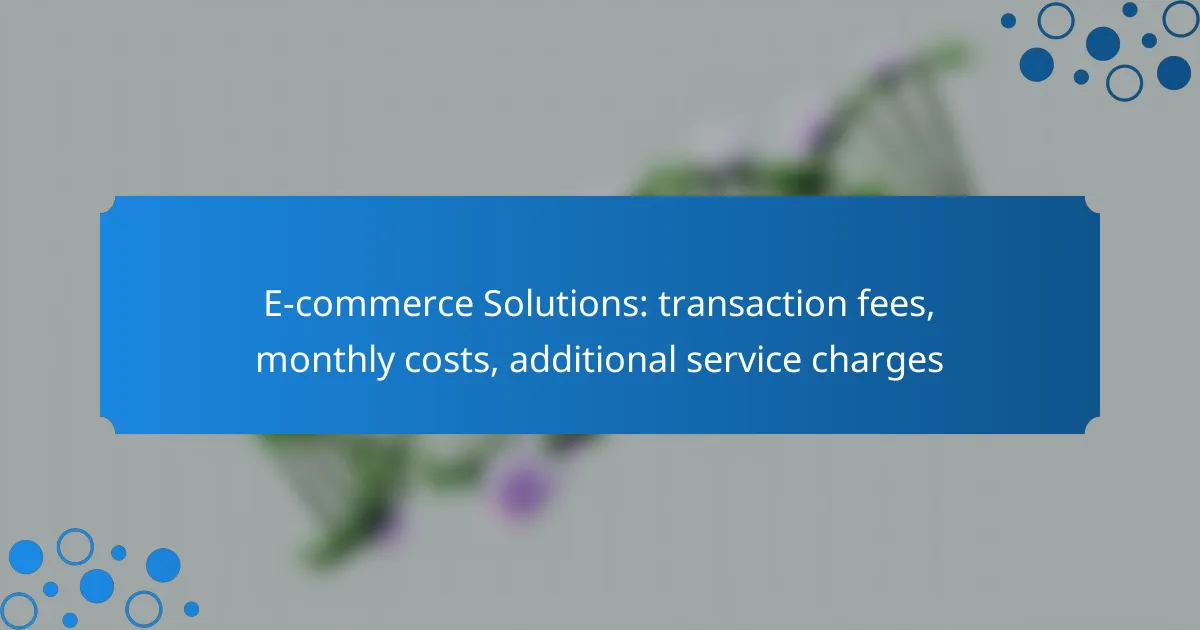E-commerce solutions come with a variety of costs that can significantly impact a business’s bottom line. Transaction fees, which can range from a percentage of each sale to fixed amounts, are just the beginning. Additionally, monthly costs for platforms can vary widely, often falling between £10 and several hundred pounds, depending on the features required. It’s essential for businesses to understand these fees, including any additional service charges, to effectively budget and maintain profitability.
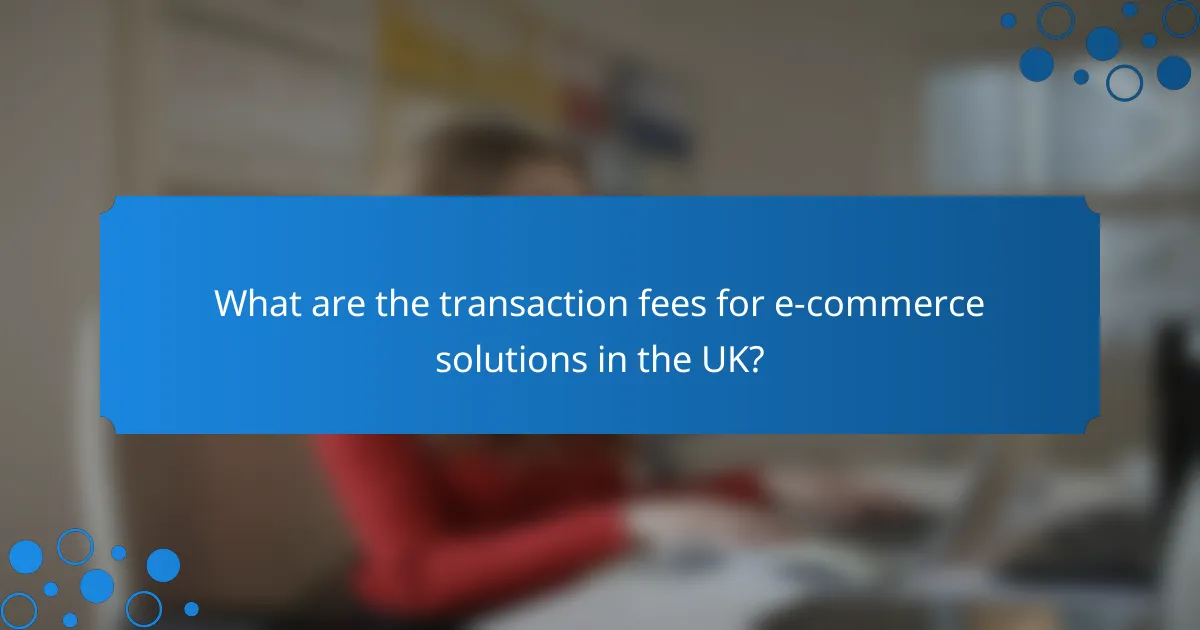
What are the transaction fees for e-commerce solutions in the UK?
Transaction fees for e-commerce solutions in the UK vary significantly based on the platform and payment processor used. Typically, these fees can range from a few percent of each sale to fixed amounts per transaction, alongside potential monthly costs and additional service charges.
Shopify transaction fees
Shopify charges transaction fees that depend on the subscription plan chosen. For example, users on the Basic plan might face fees around 2% per transaction, while those on higher-tier plans could see lower rates, such as 1% or 0.5%. Additionally, if you use Shopify Payments, these fees are waived, but third-party payment gateways incur extra charges.
It’s essential to consider the monthly subscription costs, which can range from approximately £25 to £300, depending on the features required. Always review the pricing structure to avoid unexpected costs.
WooCommerce transaction fees
WooCommerce itself does not impose transaction fees, making it an appealing option for many merchants. However, fees are incurred through payment gateways like PayPal or Stripe, which typically charge around 1.4% + £0.20 per transaction for UK cards. These fees can vary based on the gateway and the volume of transactions.
Keep in mind that while WooCommerce is free to use, hosting and additional plugins may add to your overall costs. Budget for these elements to ensure a comprehensive understanding of your expenses.
BigCommerce transaction fees
BigCommerce offers a straightforward fee structure with no additional transaction fees on any of its plans. However, payment processors may charge their own fees, generally around 2.9% + £0.20 per transaction. This can vary based on the processor and the merchant’s sales volume.
Monthly subscription costs for BigCommerce start at approximately £29 and can go up to £249 or more for advanced features. Evaluate your business needs to select the most cost-effective plan.
Magento transaction fees
Magento does not charge transaction fees directly; however, merchants must pay for payment gateway services, which can range from 1.5% to 3% per transaction. The choice of gateway significantly impacts overall costs, so selecting one that aligns with your business model is crucial.
Moreover, Magento requires hosting and development costs, which can vary widely. Ensure you factor these into your budget to avoid overspending on your e-commerce solution.
Square transaction fees
Square charges a flat transaction fee of around 1.75% for card payments in the UK, which is competitive for small to medium-sized businesses. There are no monthly fees, making it an attractive option for those just starting in e-commerce.
While Square’s pricing is straightforward, consider any additional features or services you may need, such as advanced reporting or inventory management, which could incur extra charges. Always review the full pricing details to understand your total costs.
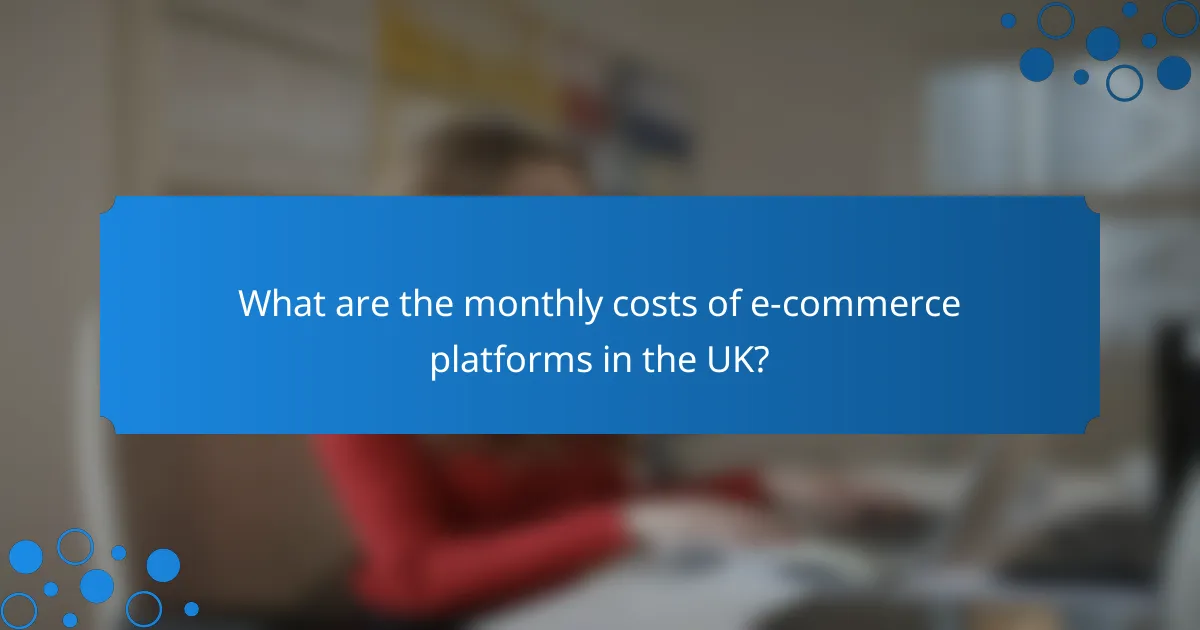
What are the monthly costs of e-commerce platforms in the UK?
The monthly costs of e-commerce platforms in the UK vary widely based on the provider and the features included. Typically, businesses can expect to pay anywhere from £10 to several hundred pounds per month, depending on their needs and the scale of their operations.
Shopify monthly pricing plans
Shopify offers several pricing tiers, starting from around £25 per month for the Basic plan, which includes essential features for small businesses. The Shopify plan, priced at approximately £65 per month, adds more advanced reporting and lower transaction fees. For larger enterprises, the Advanced plan costs about £250 per month and provides comprehensive analytics and additional staff accounts.
Consider transaction fees as well; while Shopify charges around 2% for the Basic plan, this drops to 1% and 0.5% for higher tiers. Businesses using Shopify Payments can avoid these fees entirely.
WooCommerce hosting costs
WooCommerce itself is free, but hosting costs can range from £5 to £50 per month, depending on the hosting provider and the level of service. Many businesses opt for managed WordPress hosting, which typically costs between £20 and £40 monthly, offering better performance and support.
Keep in mind that additional costs may arise from premium themes, plugins, and security features, which can add up quickly. Budgeting for these extras is essential to ensure a fully functional e-commerce site.
BigCommerce monthly subscription fees
BigCommerce offers plans starting at around £29.95 per month for the Standard plan, which includes essential features for growing businesses. The Plus plan, priced at approximately £79.95 per month, adds more advanced marketing tools and customer segmentation features.
For larger businesses, the Pro plan costs about £249.95 per month and includes additional features like product filtering and abandoned cart recovery. Be aware that transaction fees are not charged on any plans if you use a third-party payment processor.
Magento cloud pricing
Magento’s cloud pricing is more complex, as it typically requires a custom quote based on the specific needs of the business. Monthly costs can start from around £1,500 and can go significantly higher depending on the scale and features required.
Consider that Magento is a robust platform suited for larger enterprises with significant technical resources. The investment can be worthwhile for businesses needing extensive customization and scalability.
Squarespace e-commerce plans
Squarespace offers e-commerce plans starting at £20 per month for the Business plan, which includes basic e-commerce features. The Basic Commerce plan is priced at around £25 per month and removes transaction fees while providing more advanced selling tools.
The Advanced Commerce plan costs approximately £40 per month and includes features like abandoned cart recovery and advanced shipping options. Squarespace is ideal for small to medium-sized businesses looking for an all-in-one solution with visually appealing templates.
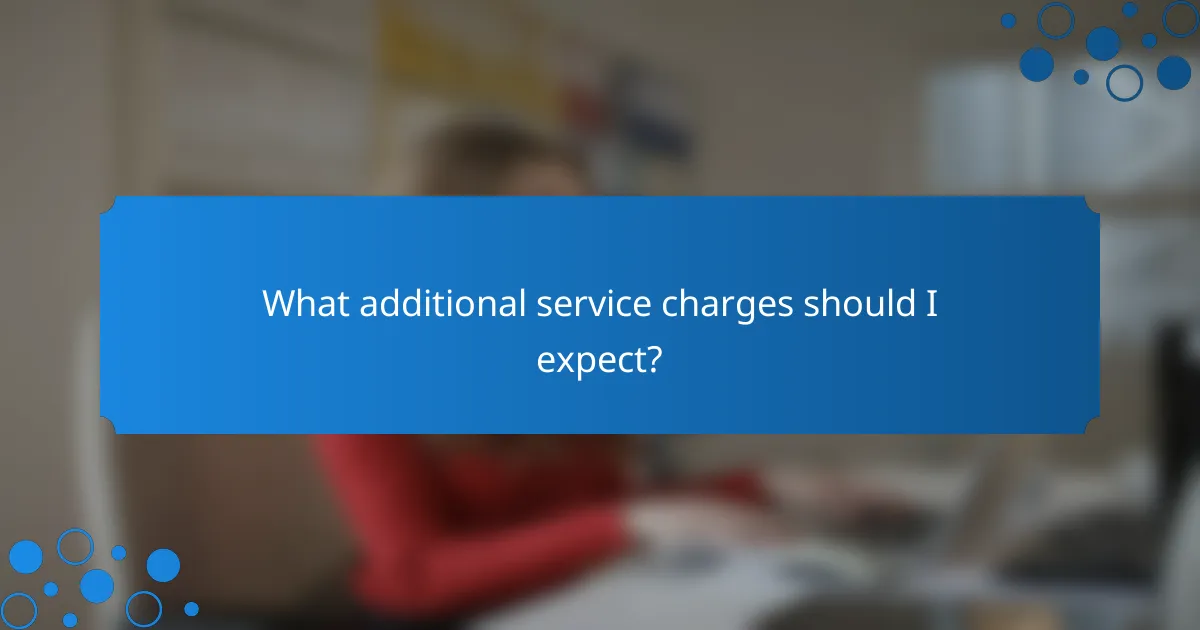
What additional service charges should I expect?
When operating an e-commerce business, various additional service charges can impact your overall costs. Understanding these fees is crucial for budgeting and ensuring profitability.
Payment gateway fees
Payment gateway fees are charges incurred when processing customer transactions online. These fees typically range from 2% to 4% of the transaction amount, depending on the provider and the payment method used.
It’s important to compare different payment gateways to find one that offers competitive rates and suits your business needs. Some gateways may charge a flat fee per transaction in addition to a percentage, so review the structure carefully.
Shipping service charges
Shipping service charges vary based on the carrier, package weight, and destination. Businesses often face costs that can range from a few dollars for local deliveries to significantly higher amounts for international shipping.
Consider negotiating rates with carriers or using shipping software that can help you find the best deals. Offering free shipping over a certain purchase amount can also encourage larger orders, offsetting some shipping costs.
App integration costs
Integrating third-party applications to enhance your e-commerce platform can incur additional costs. These may include one-time setup fees or ongoing subscription charges, typically ranging from $10 to $200 per month, depending on the app’s complexity and functionality.
Evaluate the value each app brings to your business to justify the expense. Prioritize integrations that streamline operations or improve customer experience.
SSL certificate fees
An SSL certificate is essential for securing customer data during transactions. Costs for SSL certificates can range from free options to several hundred dollars per year, depending on the level of validation and warranty provided.
Investing in a reputable SSL certificate is crucial for building customer trust and ensuring compliance with security standards. Look for certificates that offer robust encryption and support for various browsers.
Customer support charges
Customer support charges may arise if you choose to outsource support services or use specialized software. Costs can vary widely, from a few hundred dollars per month for basic services to thousands for comprehensive support solutions.
Consider the level of support your customers expect and balance it with your budget. Offering self-service options, like FAQs or chatbots, can reduce the need for extensive support while still assisting customers effectively.
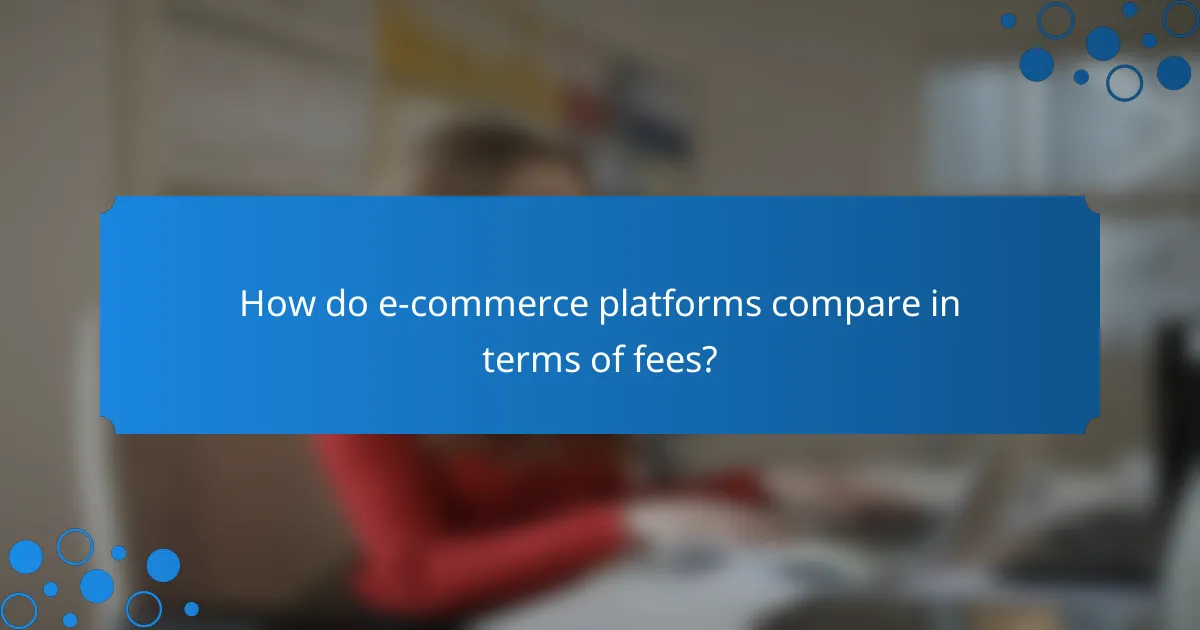
How do e-commerce platforms compare in terms of fees?
E-commerce platforms vary significantly in their fee structures, which can impact your overall costs. Key factors include transaction fees, monthly subscription costs, and additional service charges, all of which can influence your choice of platform.
Shopify vs WooCommerce fees
Shopify typically charges a monthly subscription fee ranging from around $29 to $299, depending on the plan selected. Additionally, transaction fees can apply unless you use Shopify Payments, which eliminates these charges but may have its own processing fees.
WooCommerce, on the other hand, is a free plugin for WordPress, but users must pay for hosting, which can range from about $5 to $50 monthly. While WooCommerce does not charge transaction fees, payment gateways like PayPal or Stripe may impose their own fees, often around 2.9% plus a fixed amount per transaction.
BigCommerce vs Magento fees
BigCommerce offers tiered pricing plans starting from approximately $29.95 to $299.95 per month, with no additional transaction fees, making it appealing for larger sales volumes. However, users should consider potential costs for add-ons and payment processing fees, which can vary.
Magento, known for its flexibility, is available in both a free Community Edition and a paid Enterprise Edition, which can be quite costly. While the Community Edition has no licensing fees, users must budget for hosting, security, and maintenance, which can add up significantly, often exceeding $100 monthly depending on the scale of the operation.
Square vs Shopify fees
Square operates on a straightforward pricing model with no monthly fees for its basic plan, charging a flat rate of around 2.6% plus 10 cents per transaction. This makes it a cost-effective option for small businesses that process lower volumes of sales.
Shopify, in contrast, has a monthly fee structure starting at $29, along with transaction fees unless using Shopify Payments. This can lead to higher costs for businesses with significant sales, particularly if they opt for lower-tier plans that incur transaction fees.
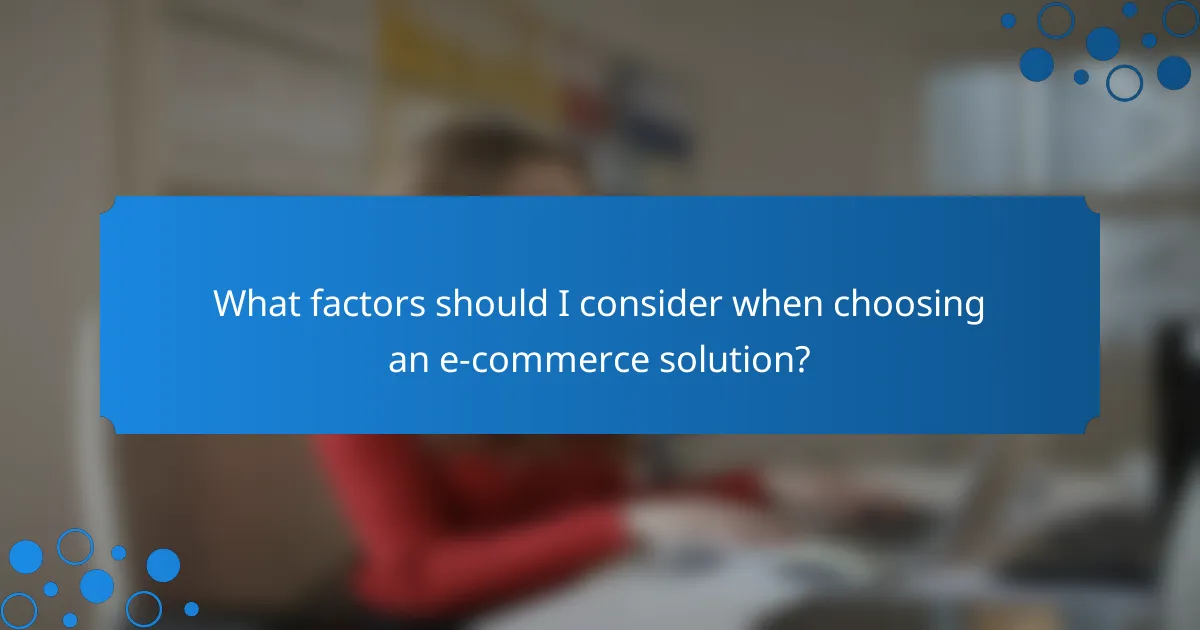
What factors should I consider when choosing an e-commerce solution?
When selecting an e-commerce solution, consider transaction fees, monthly costs, and any additional service charges that may apply. Understanding these factors can help you choose a platform that aligns with your business model and budget.
Transaction fee structures
Transaction fees are charges that e-commerce platforms impose for processing payments. These fees can vary significantly based on the payment method, the provider, and the sales volume. Common structures include a flat fee per transaction, a percentage of the sale, or a combination of both.
For example, some platforms may charge around 2-3% of each sale plus a small fixed fee, while others might offer lower percentages for higher sales volumes. It’s crucial to evaluate how these fees will impact your overall profitability, especially if you expect to process a large number of transactions.
When comparing platforms, look for any hidden fees associated with specific payment methods or currency conversions. Additionally, consider whether the platform offers a tiered pricing model that could benefit your business as it grows. Always read the fine print to avoid unexpected costs.
